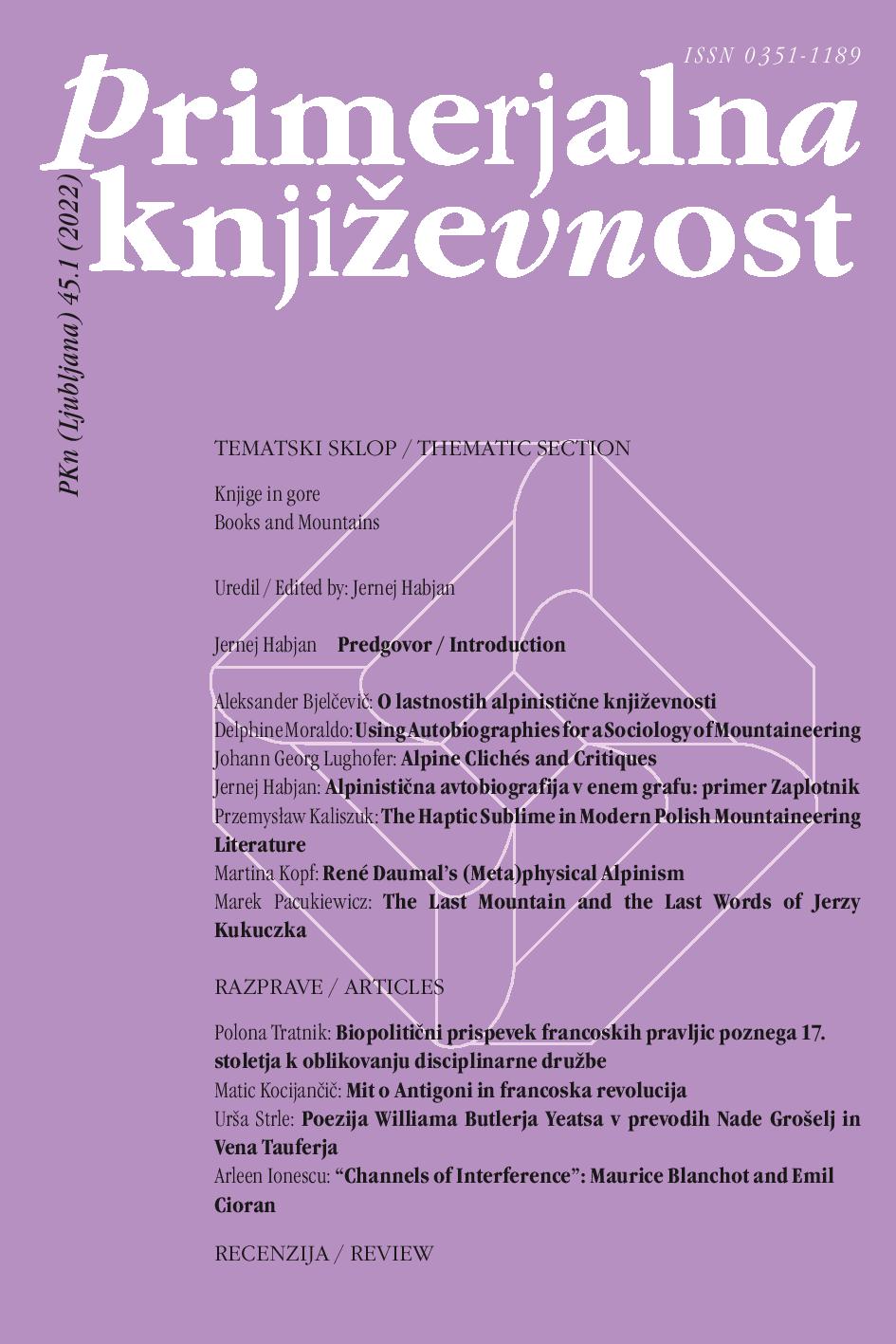Alpine Clichés and Critiques: Developments and Tensions in German-Language Literature
DOI:
https://doi.org/10.3986/pkn.v45.i1.03Keywords:
literature and alpinism, Austrian literature, national identity, cultural stereotypes, The Alps, Roth, Joseph, Horváth, Ödön vonAbstract
This article argues that the role of the Alps in German-language literature is embedded both in a socio-historical context and in the topoi or commonplaces that emerged from that context. Using examples drawn primarily from two very different Austrian authors of the interwar period—namely, Joseph Roth (1894–1939) and Ödön von Horváth (1901–1938)—as well as from their German-speaking predecessors and successors, the aim is to show the literary approaches used to undermine traditional topoi. Today, the Alps are the quintessential defining landscape for the Republic of Austria as well as for Austrian literature, yet they were demystified already in the literature of the interwar period. The themes and literary strategies of these literary works anticipate post-1945 literature, while showing surprising breadth in their approach to the Alps. Much of what is commonly understood today as a reaction to the use of the Alpine and of alpinism for Nazi propaganda belongs in fact to older traditions.
References
Böhme, Hartmut. “Berg.” <em>Wörterbuch der philosophischen Metaphern</em>. Ed. Ralf Konersmann. Darmstadt: WBG, 2007. 46–61.
Bronsen, David. <em>Joseph Roth. Eine Biographie</em>. Cologne: Kiepenheuer & Witsch, 1974.
Günther, Dagmar. <em>Alpine Quergänge</em>. Frankfurt: Campus, 1998.
Haase, Michael. “‘Oben ist immer schön’—Zur Symbolik der Alpen in Arthur Schnitzlers Tragikomödie <em>Das weite Land</em> (1911).” <em>Das Erschreiben der Berge</em>. Ed. Johann Georg Lughofer. Innsbruck: Innsbruck University Press, 2014. 179–190.
Handke, Peter. <em>Nocheinmal vom Neunten Land. Erinnerungen an Slowenien</em>. Klagenfurt: Wieser, 1993.
Hildebrandt, Dieter. <em>Ödön von Horváth mit Selbstzeugnissen und Bilddokumenten</em>. Reinbek bei Hamburg: Rowohlt, 1975.
Höbusch, Harald. <em>“Mountain of Destiny”: Nanga Parbat and Its Path into the German Imagination</em>. Rochester, NY: Camden House, 2016.
Horváth, Ödön von. <em>The Eternal Philistine</em>. Trans. Benjamin Dorvel. Brooklyn, NY: Melville House Publishing, 2012.
Horváth, Ödön von. <em>Der ewige Spießer. Wiener Ausgabe sämtlicher Werke</em>. Vol. 14. Eds. Klaus Kastberge and Kerstin Reimann. Berlin: De Gruyter, 2010.
Horváth, Ödön von. “Die Bergbahn. Volksstück in drei Akten.” <em>Zur schönen Aussicht und andere Stücke. Gesammelte Werke</em>. Vol. 1. Ed. Traugott Kirschke. Frankfurt: Suhrkamp, 1988. 89–132.
Jelinek, Elfriede. <em>Die Kinder der Toten</em>. Reinbek: Rowohlt, 1995.
Lebert, Hans. <em>Der Feuerkreis</em>. Vienna: Europa, 1992.
Loquai, Franz. <em>Die Alpen. Eine Landschaft und ihre Menschen in Texten deutschsprachiger Autoren des 18. und 19. Jahrhunderts</em>. Munich: Goldmann, 1996.
Luckscheiter, Christian. “Die brutale Lektüre der Bergvagabunden. Hans Ertl und die Alpen.” <em>Das Erschreiben der Berge</em>. Ed. Johann Georg Lughofer. Innsbruck: Innsbruck University Press, 2014. 157–167.
Nietzsche, Friedrich. <em>Thus Spoke Zarathustra</em>. Trans. Graham Parker. Oxford: Oxford University Press, 2008.
Pfabigan, Alfred. <em>Geistesgegenwart</em>. Vienna: Edition Falter, 1991.
Pollack, Martin. <em>Kontaminierte Landschaften</em>. Salzburg: Residenz, 2014.
Raymond, Petra. <em>Von der Landschaft im Kopf zur Landschaft aus Sprache</em>. Tübingen: Max Niedermeyer, 1993.
Risi, Marius. <em>Alltag und Fest in der Schweiz. Eine kleine Volkskunde des kulturellen Wandels</em>. Zurich: Pro Helvetia Kommunikation, 2003.
Roth, Joseph. <em>The Emperor’s Tomb</em>. Trans. John Hoare. New York, NY: The Overlook Press, 2002.
Roth, Joseph. <em>Flight Without End</em>. Trans. David Le Vay. London: Peter Owen, 1977.
Roth, Joseph. “Requiem Mass.” <em>On the End of the World</em>. Trans. Will Stone. London: Pushkin Press, 2019. 33–35.
Roth, Joseph. <em>The Spider’s Web and Zipper and His Father</em>. Trans. John Hoare. London: Chatto & Windus, 1988. 113–245.
Roth, Joseph. <em>Werke</em>. 6 vols. Eds. Fritz Hackert and Klaus Westermann. Cologne: Kiepenheuer & Witsch, 1989–1991.
Schiller, Friedrich. “Wilhelm Tell.” <em>Complete Works</em>. Vol. 1. Ed. and trans. Charles J. Hempel. Philadelphia, PA: I Kohler, 1861. 596–641.
Schiller, Friedrich. “Wilhelm Tell.” <em>Sämtliche Werke in 16 Bänden</em>. Vol. 6. Ed. Karl Goedeke. Stuttgart: Verlag der J. G. Cotta’schen Buchhandlung, 1893. 3–158.
Tschofen, Bernhard. <em>Berg, Kultur, Moderne</em>. Vienna: Sonderzahl, 1999.
Tworek-Müller, Elisabeth. “Provinz ist überall.” <em>Horváths Prosa</em>. Ed. Trautgott Krischke. Frankfurt: Suhrkamp, 1988. 34–56.
Vejvar, Martin. “‘…wie der Kitsch die seinerzeit geborstene Erdkruste nennt.’ Die Alpen bei Ödön von Horváth.” <em>Das Erschreiben der Berge</em>. Ed. Johann Georg Lughofer. Innsbruck: Innsbruck University Press, 2014. 205–218.
Wiegmann-Schubert, Eva. “‘Auf den Alpen, kann man weiter von Europa entfernt sein als auf einer Südseeinsel.’ Zur Funktion des Alpen-Topos im kulturkritischen Diskurs der Schweiz.” <em>Das Erschreiben der Berge</em>. Ed. Johann Georg Lughofer. Innsbruck: Innsbruck University Press, 2014. 169–178.
Zopfi, Emil. <em>Dichter am Berg</em>. Zurich: AS, 2009.


